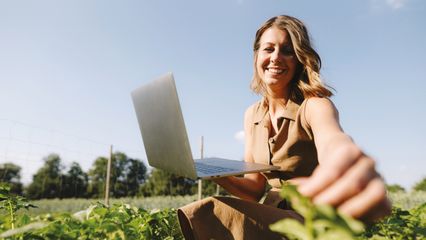Sustainability
In 2022, Sabancı Group led the sectors in which it operates via the Group’s sustainability approach, and became a game changer in terms of making sustainability a core element of the Group’s growth strategy.

2022 ushered in a new era of complex sustainability concerns as environmental, social and security crises converged and intensified worldwide.
At Sabancı Group, such crises do not lead to compromise on the Group’s sustainability roadmap. Instead, it sees sustainability as a way to make its businesses more resilient to future shocks.
In 2022, Sabancı Group led the sectors in which it operates via the Group’s sustainability approach. This forwardlooking approach enables better understanding of today’s environmental, social and governance (ESG) related challenges and becoming a game changer in terms of making sustainability a core element of the Group’s growth strategy. With the best practices it has implemented in ESG areas, Sabancı Holding has integrated sustainability into its business model across all sectors.
With core business lines of energy, industrials, and financial services, Sabancı Group aims to transform its existing investments to become more sustainable. Meanwhile, new generation growth platforms are identified in sustainable and high-tech business areas. Energy and climate technologies, material technologies and digital technologies – core elements of the ‘new economy’ – are central to the Group’s growth strategy. By focusing on these key areas, Sabancı Group aims to ensure the highest level of contribution to the transition to a more sustainable economy. With this approach, the Group also maximizes the value it creates for all its stakeholders – including shareholders, investors, employees, and society as a whole.
Committed to doing business responsibly, Sabancı Group launched an organization-wide Responsible Investment Policy in 2022. This policy was formulated to guide the capital allocation decisions of Sabancı Group and to ensure the sustainability of the Group’s value chain. The Responsible Investment Policy aims to set forth the basic principles for environmental, social, ethics, governance and human rights related issues in the investment portfolio of the Group, based on national and international standards and good practices.
The policy provides a framework to support the management of risks related to these issues, in addition to clearly defining prohibited investment sectors and activities for Group companies. The Responsible Investment Policy also demonstrates the Group’s strong commitment to improve the Group’s contribution to Sustainable Development Goals (SDG) and to boost the ESG performance across Sabancı Group’s entire value chain.
Sabancı Holding’s continuous improvement of its ESG framework boosted its performance in prestigious sustainability ratings and indices. In 2022, Sabancı Holding’s ESG rating was upgraded from ‘BBB’ to ‘A’ by MSCI, one of the most widely used ESG rating firms for responsible investment worldwide. Sabancı Holding is also included in the BIST 25 Sustainability Index whose constituents are BIST-listed companies with the top corporate sustainability performance in Türkiye. Sabancı Holding maintained its performance on climate change and water-related actions and achieved a ‘B’ score in both CDP Climate Change and CDP Water programs, both standing for “Management Level.”
In 2022, Sabancı Holding’s ESG rating was upgraded from `BBB’ to `A’ by MSCI, one of the most widely used ESG rating firms for responsible investment worldwide.
Sabancı Holding received an ‘A’ rating, represents ‘Excellent Performance,’ among more than 50 companies in the “Investment Holdings” category in accordance with the Refinitiv ESG Assessment. In addition, Sabancı Holding has been assessed as “Low Risk” for the ESG risk metrics in the “Diversified Financials” category by Sustainalytics ESG Rating, which put us among the world’s leading companies on ESG matters.
Beyond its own internal ESG-related efforts, Sabancı Holding participates in local and international sustainability platforms and initiatives that advocate for further change to environmental and social policy frameworks. As a result, Sabancı Holding is able to make an impactful contribution for the transition of the global economy and steer international standards.
Sabancı Group is a member of the United Nations Global Compact (UNGC), the World Business Council for Sustainable Development (WBCSD), the World Economic Forum (WEF), and the CNBC ESG Council. In addition, the Group supports local associations and committees to accelerate the transition of Türkiye’s economy to a more sustainable model and enhance the resilience of society and economy to sustainability risks. For example, Sabancı Group has high level representation on various commissions and working groups in the Turkish Industry & Business Association (TÜSİAD), which plays a major role in Türkiye’s economy.
investment approach into its business operations while embracing a “do no significant harm” philosophy.
Sustainability Roadmap
Sabancı Group’s sustainability roadmap focuses on three main pillars: Acting on the Climate Emergency, Maximizing Positive Impact on People and Society, and Fostering Sustainable Business Models.
Acting on the Climate Emergency
Sabancı Group has identified actions to achieve Net Zero Emissions and Zero Waste by 2050 at the latest. Towards achieving these targets, the Group’s top priorities to minimize negative impacts of the climate emergency include focusing on environmental trends such as adopting circular economy practices and carrying out biodiversity efforts where required. Reaching Net Zero Emissions and Zero Waste by 2050 at latest are challenging but essential parts of the Group’s targets. This effort includes the Group’s Scope 1 and 2 emissions. Sabancı Group aims to include Scope 3 emissions to the extent that is feasible and practically possible. The Net Zero Emissions target includes reducing the Group’s ground emissions to the extent possible and then using credible offset methods such as nature-based solutions. All three of the Group’s industrial companies committed to the Science Based Targets initiative (SBTi) as of December 2022.
In parallel with enhancements to the ESG governance mechanisms across the Group’s businesses and a significant increase in non-financial disclosure, Sabancı Group companies announced their decarbonization roadmaps in 2022. Sabancı Group finalized the first phase of a Group-wide decarbonization initiative that helps to identify key improvement areas related to its Net Zero Emissions target and to address remaining gaps across all companies. As a result of this study, Sabancı Group boosted the number of its businesses that are SBTi aligned in 2022. The Group’s decarbonization journey and the outcomes of its efforts in this regard will be further elaborated in the Sabancı Holding 2022 Sustainability Report.
Maximizing Our Positive Impact on People and Society
This pillar refers to the key community investment programs that go hand in hand with Sabancı Group’s core strategy and business activities. The Group also commits to undertaking a strategic review of existing programs to ensure that all resources expended create the maximum possible impact. Sabancı Group embraces the idea of leaving no one behind. To this end, the Group aims to support all segments of society in an inclusive manner. Sabancı Group plans to assess the impact of its major community investment programs and remain above the threshold identified for social return on its investments.
Group companies have started measuring the Social Return on Investment (SROI) of their community investment programs. For further details, please visit the Sabancı Holding 2021 Sustainability Report.
Fostering Sustainable Business Models
Under this pillar, Sabancı Group aims to integrate a responsible investment approach into its business operations while embracing a “do no significant harm” philosophy and developing innovative products, services, and solutions in line with its ambitious target. Sabancı Group plans to continuously improve its SDG-linked products and services in terms of number and their share of total net sales revenues. At present, nearly 51% of Sabancı Group’s R&D and innovation expenses are sustainability-linked. To boost the share of SDG-linked products and reduce waste and emissions, the Group aims to increase this ratio to more than 70% by 2025. In response to the EU’s focus on value chain due diligence, Sabancı Group’s Responsible Investment Policy was published with provisions about the due diligence process on human rights and environment.

In addition to these three pillars, Sabancı Group sees digitalization, technology, and innovation as accelerators to help reach its goals faster. Human Capital and Governance are the foundations of maintaining and further enhancing the Group’s performance.
Sabancı Group considers sustainability as a central theme in all its innovation and business development initiatives and an integral part of its core strategy. As a result, the Group is making new investments especially in climate technologies and digital technologies that create positive environmental and social impact.
Sabancı Group’s sustainability-related investment highlights of 2022 include:
- Commonwealth Fusion Systems, an initiative with high capability to implement fusion technology, and Quaise Energy, which develops deep geothermal energy technologies.
- The first green hydrogen plant of the Turkish industry.
- Artificial intelligence-based disease management and telehealth service platform in digital health.
- One of the world’s leading startups, Radiflow, in cyber security especially in operational technologies.
- 55 MW wind power plant in Akhisar and 65 MW wind power plant in Kayseri, Türkiye to reach 45% renewables share in the generation portfolio.
- A total of 1,000 MW of wind power plants covering the YEKA-2 tenders with a total investment of USD 1.2 billion under an agreement between Enerjisa Üretim and Enercon Group.
- Solar power plant investment with an installed capacity of 272 MW in Texas.
- Climate tech and renewable energy investments in the USA with Safar Partner VC investments.
- Investment in Toledo, a new generation thin-film solar panel manufacturer, with Kordsa.
- Acquisition of Arvento Mobile Systems to transform into a mobility solutions business, with Brisa.
- Solar power plant investments at Çimsa’s Afyon Cement Factory and Brisa’s Aksaray Factory.
- İklimsa end-to-end service and solar energy systems service.